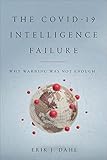The COVID-19 Intelligence Failure : why warning was not enough / Erik J. Dahl.
Material type: TextPublisher: Washington, DC : Georgetown University Press, 2023Description: viii, 195 pages : illustrations ; 23 cmContent type:
TextPublisher: Washington, DC : Georgetown University Press, 2023Description: viii, 195 pages : illustrations ; 23 cmContent type: - text
- unmediated
- volume
- 9781647123055
- 614.5/92414 23/eng/20220218
- RA644 .C67 D131 2023
| Item type | Current library | Collection | Call number | Copy number | Status | Notes | Barcode | |
|---|---|---|---|---|---|---|---|---|
 Books
Books
|
Rabdan Academy General Stacks | General Collection | RA644 .C67 D131 2023 (Browse shelf(Opens below)) | C. 1 | Available | $ 87.70 | 22616 |
Browsing Rabdan Academy shelves,Shelving location: General Stacks,Collection: General Collection Close shelf browser (Hides shelf browser)

|

|

|

|

|

|

|
||
| R859.7 .A78 C676 2022 Cognitive Intelligence and Big Data in Healthcare / | R859.7 .A78 C738 2022 Computational Intelligence and Image Processing in Medical Applications / | RA407.5 .M597 R128 2021 Knowledge Management and Organization : healthcare quality in Montenegro / | RA644 .C67 D131 2023 The COVID-19 Intelligence Failure : why warning was not enough / | RA644 .C67 S128 2022 Safety and Resilience of Higher Educational Institutions : considerations for a post-COVID-19 pandemic analysis / | RA644 .C67 S128 2022 Safety and Resilience of Higher Educational Institutions : considerations for a post-COVID-19 pandemic analysis / | RA644 .C758 2022 Constitutional Resilience and the COVID-19 Pandemic : perspectives from Sub-Saharan Africa / |
Includes bibliographical references and index.
Are Pandemics a National Security Problem? -- What is the Role of the U.S. Intelligence Community? -- The Medical Intelligence, Surveillance, and Warning System -- Was the Coronavirus Pandemic an Intelligence Failure? -- Intelligence and Warning for the Future
"Erik J. Dahl examines the role of intelligence in providing advance warning to policymakers about the threat of pandemics. Dahl also considers the question of whether or not the Covid-19 pandemic was an intelligence failure. He begins the book by describing how both US national security intelligence agencies and public health surveillance organizations provide warning. He describes the similarities and differences between them and how these communities do and do not work together. Dahl goes on to argue that this pandemic was indeed a global intelligence failure, one in which the established worldwide system of collection and analysis was unsuccessful in giving sufficient warning to prevent the global spread of the disease. He explains why policymakers needed a different type of intelligence than what was available, and he makes recommendations for how the national security intelligence and public health communities can work more effectively together in the future. This pandemic could not have been completely avoided even with more actionable intelligence due to the nature of the disease and the Trump administration's aversion to accepting advice from the intelligence and scientific communities. However, unearthing intelligence in both secret and open sources to provide early warning of an outbreak is of paramount importance to giving policymakers the opportunity to avert or mitigate the effects of future pandemics"-- Provided by publisher.
There are no comments on this title.
